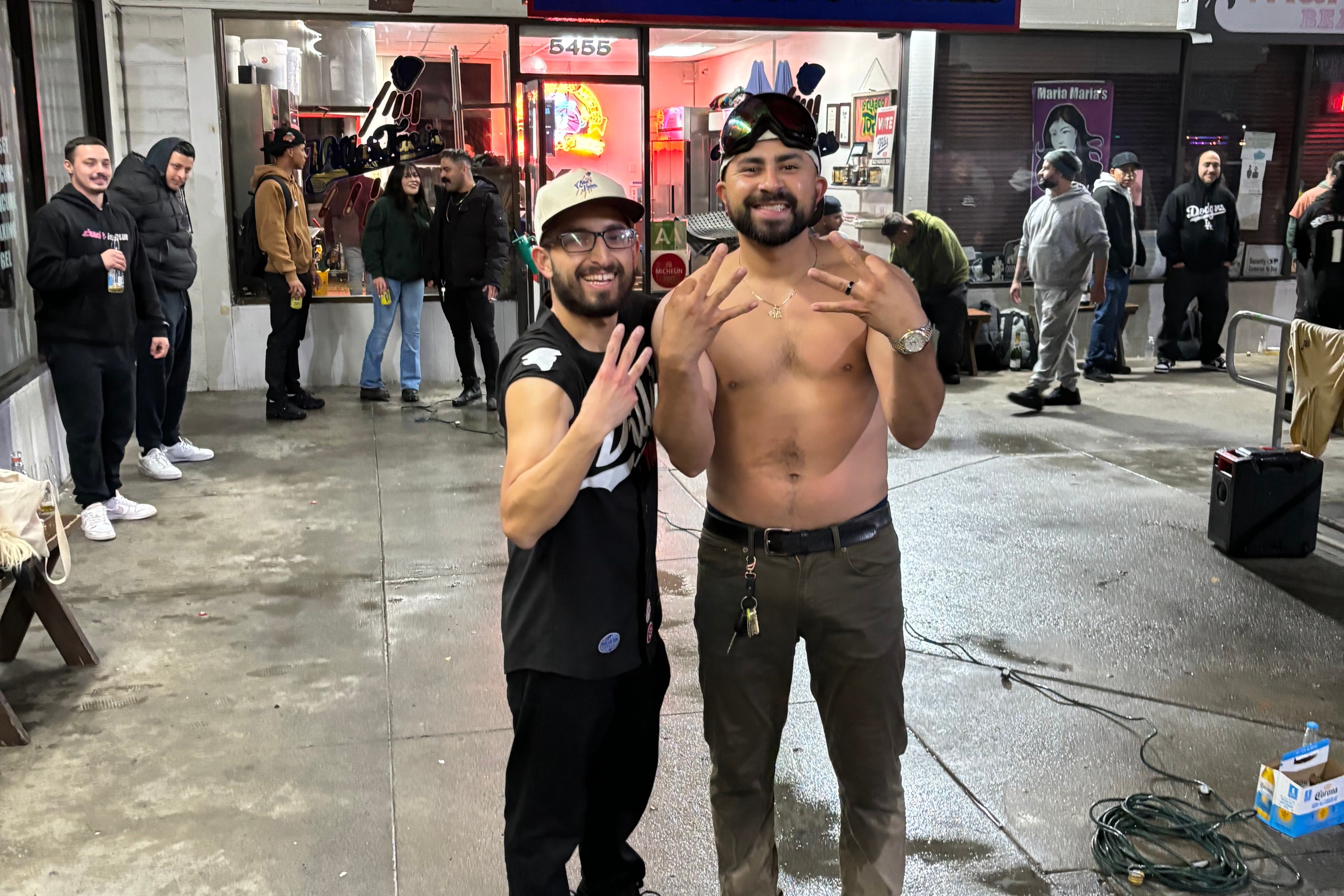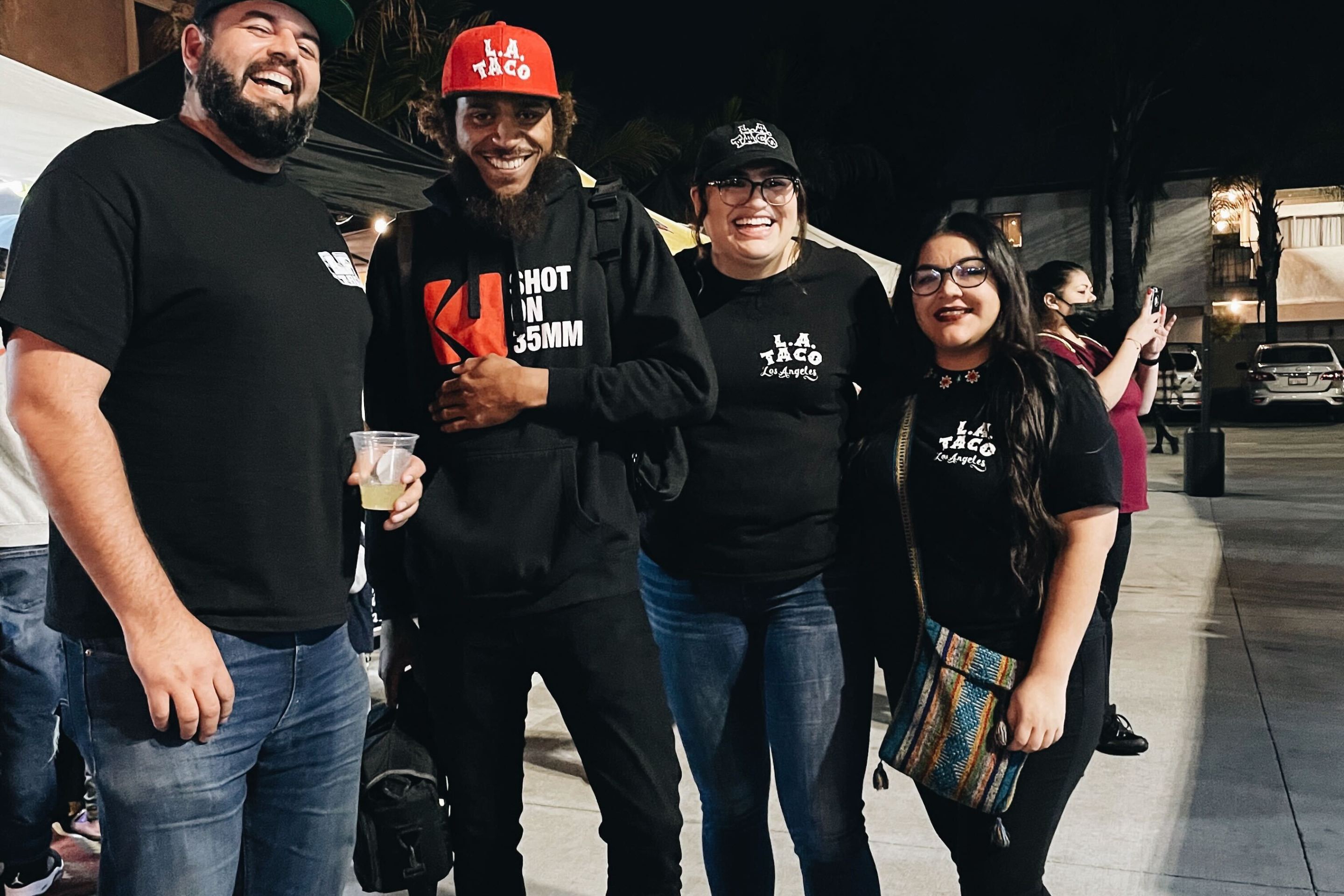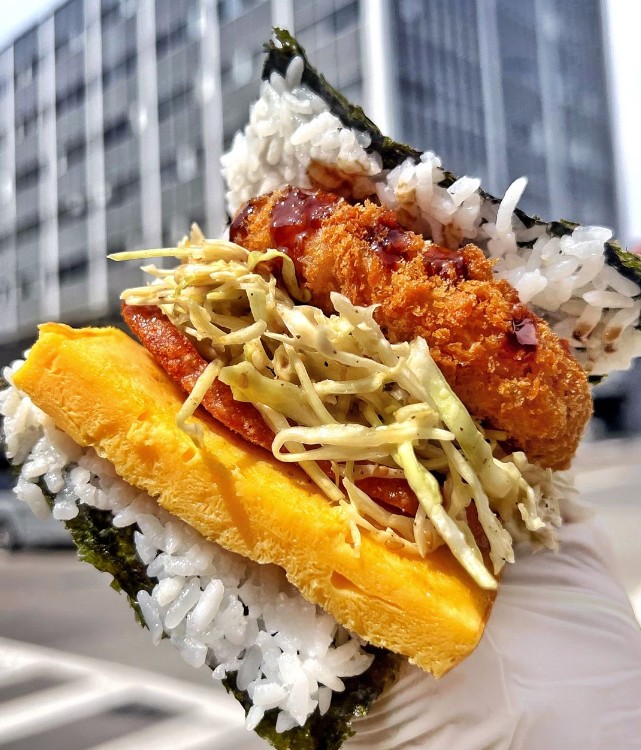Grass-Fed and Grass-Finished Lies: How a Butcher From NELA Exposed One of California’s Biggest ‘Sustainable’ Beef Farms
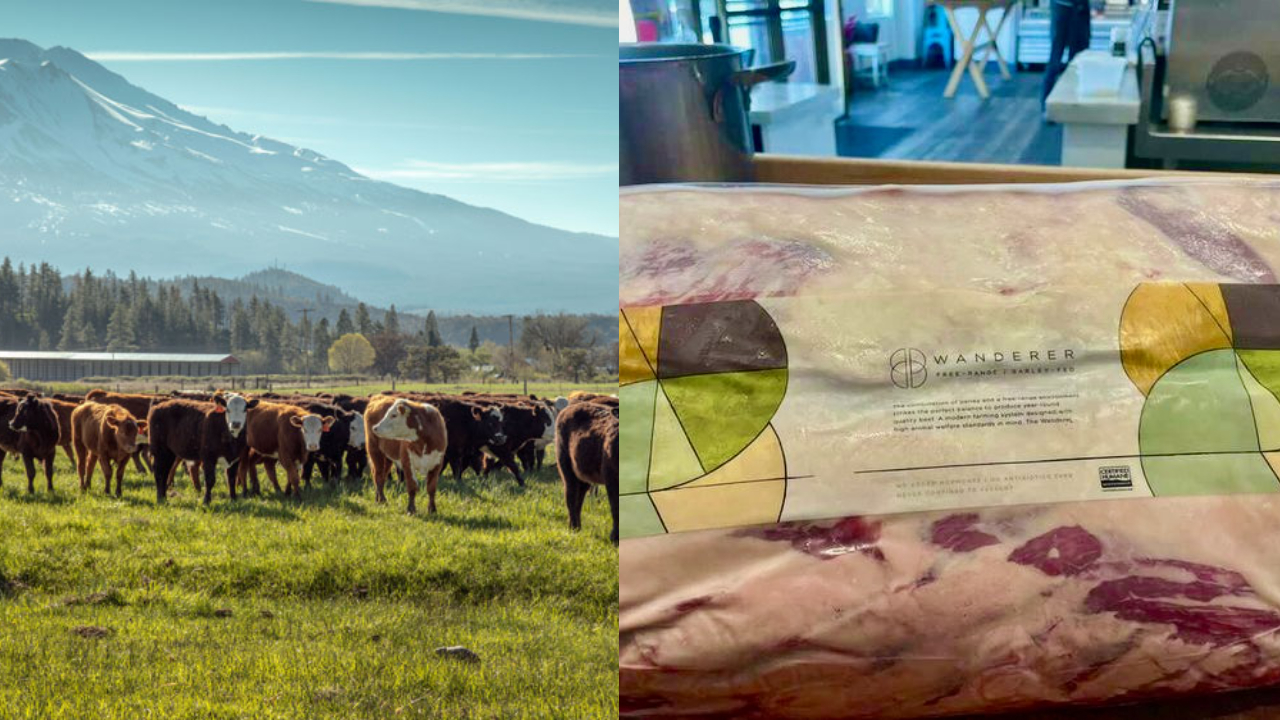
[dropcap size=big]F[/dropcap]or most Angelenos, Belcampo Meat Co. was that spot with the solid burger and expensive meat that you had to put on layaway—just in time for next year’s carne asada. The company is known for its sustainability-focused boutique butcher shops, restaurants, and online stores with several California locations.
Their whole thing was “to create meat that’s good for people, planet, and animals,” which all started at their idyllic “30,000-acre farm at the base of Mt. Shasta.” They used terms like “Climate Positive” and “Regenerative Agriculture” on their website. When it first appeared, their fancy burger was lauded by local L.A. media for its taste and transparent sourcing. The farm’s alleged philosophy was the focus in a documentary, even.
On May 23rd, Evan Reiner, L.A. butcher, and ex-employee from Belcampo Meat Co, exposed practices by the company like mislabeling and fraudulently selling meat that wasn’t from their farm. In a series of Instagram posts, he recorded himself in the fridge of the Santa Monica location and showed the various types of proteins that weren’t Belcampo products. He shows multiple beef cuts vacuum sealed with labels from wholesale beef suppliers like Rocker Bros, “USDA choice, corn fed. Bought for a little over $10/lb sold for $47.99/lb as ‘organic,’” one of the posts claims. Belcampo built a reputation for its sustainability ethos, humanely raised meat, a focus on being “good for the planet,” and most importantly, transparency.
“I'm just exposing the truth. That's all I was doing. I was just taking photos of my day-to-day shit at work, showing people what's really going on,” says Reiner. In addition to Rocker Bros, Reiner also shared photos of a Cape Grim tenderloin imported from Tasmania, a rack of beef ribs from National Beef, two boxes of chicken, one from Pasturebird, and another from Mary’s Chicken, and a Country Day turkey. Reiner also shared pictures with L.A. TACO of a rack of beef ribs from Wanderer, which is grass and barley fed.
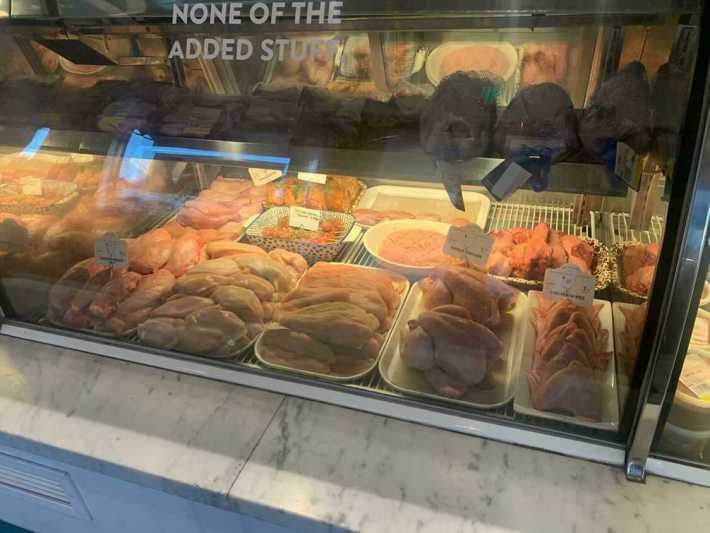
Greenwashing was a term thrown around in social media comments that describe the deceptive process of using environmentally friendly/conscious, or green, marketing to describe their product. Belcampo’s butchery and restaurant components participated in the same systems they claimed to combat with their mission statement.
Their beef is advertised as grass-fed and grass-finished. But what the fuck does that even mean? Well, it means that cattle feed on only grass for their entire lives. While grass-fed refers to the practice of cattle grazing for at least a portion of their life, but there’s no guarantee that the cow only ate grass its whole life. Often grass-fed can still mean that it was grain-finished. Grass-finished is like a guarantee to the consumer that the cow ate grass their entire life. The significant difference is the lack of fat marbling characteristic of grain-fed beef. Therefore grass-fed and finished means leaner beef. Grass-fed and finished beef is also sought for its health benefits, including lower fat content, omega-3 essential fatty acids, vitamins, and antioxidants.
But Reiner started a storm that uncovered more instances of Belcampo outsourcing proteins. Since his IG posts, more ex-employees have come forward with their experiences. L.A. TACO spoke to four different sources, all of which want to remain anonymous for fear of retaliation.
Hiding labels
Each source that we spoke to for this story confirms that their store had similar practices of purchasing non-Belcampo meat and not informing the customer. Management even went as far as to reprimand employees who showed the labels in those cases where they supplemented proteins. In Reiner’s initial set of posts, he claims that he was told to hide labels from customers, “Don’t let the customers see the labels, please be careful with the Rockers,” Reiner says in an interview.
“Yeah, definitely customers noticed. It was apparent,” says Reiner, “Grass-fed meat doesn’t have a lot of marbling, and one day you just see like a spider-web of marbling.”
One ex-employee from the West Third Street location was told to never show outside labels to customers. One incident around Thanksgiving 2020 involved the repackaging of turkeys purchased from Rocker Bros. “We pleaded with [the farm] like hey, we need turkeys, please save some turkeys for the restaurants and butcher shops. So basically, they sent only 20 turkeys to West Third, around 100 to 200 to Santa Monica. And [when] everyone ran out, we started outsourcing, but the thing about me is like I don't like to keep people out,” explains the ex-employee, “So yeah, I did buy some turkeys. But they had labels on them.”
The director of operations for the West Third location did not like that. “[He] tells me, ‘what the fuck are you doing? You can’t have outside labels in the case,” the ex-employee explains. “What he did was grab the turkeys, ran them to Santa Monica, which had a bigger cryovac, and then re-cryovaced the turkeys and placed Belcampo labels on them.”
One ex-employee at the Oakland location alleges that in 2020 they saw a similar incident where an assistant manager went to a local restaurant supply nearby to get steaks and sell at the store. Customers were not informed of the difference in quality. “What I saw and thought was happening at first was occasional outside meat being used to supplement during a crunch, but then it turned into we didn’t get a shipment, and then the farm doesn’t have enough,” the ex-employee of the Oakland locations says.
Customers noticing
Another ex-employee from the Santa Monica location recounts times where customers noticed the difference in quality in cooked dishes. They used to have a “pasture-raised” roasted chicken dish with balsamic and veggies that was a crowd favorite but then there was a shift. “This dish got sent back, probably like over 90% of the time, and then turns out it is not a pasture-raised chicken.” explains the ex-employee.
An implicit part of Belcampo’s business is the assumption that their ethos of sustainability and transparency was present throughout their entire operation.
In July 2020, Reiner had a knee injury that caused him to leave Belcampo, but he noticed that things had changed once he came back in November. He recalls instances where customers noticed the difference in the quality of beef. “Yeah, definitely customers noticed. It was apparent,” says Reiner, “Grass-fed meat doesn’t have a lot of marbling, and one day you just see like a spider-web of marbling.”
Two parts of the company
Ex-employees explain two almost separated entities in Belcampo, the farm, which handled the online sales and wholesale, and the storefronts, which are the butcher shops and restaurants. Combined with the company’s rapid expansion since 2014, the restaurants and butcher shops struggled to stay profitable because the online store was the priority.
The struggle for the locations with restaurants, one ex-employee from the West Third Street location alleges, was that for specific items, the farm either priced the supply too high or simply did not have enough to meet demand. This ultimately made it difficult to make a profit.
The ex-employee from West Third had a position that involved purchasing for the restaurant and butcher shop. They recall times where they were pressured to keep the butcher case full. “When we got shorted [by] the farm during COVID, I had to get filets, rib roasts, and New York [strips] from Rocker Bros,” they explain, “The farm which is our main supplier can price things ridiculously for us, like 80-90% [food] cost and [they] didn’t care because we had to buy it. So our way was like, if you guys won’t budge your prices, then we’re going to outsource and make some money for once.”
But it was a fine line. On the one hand, you had to make sure food costs did not exceed the allocated budget while still keeping the case full.
“There’s certain things on the farm that are cheaper than Rocker Bros like the New York [filets], and the ribeyes. But the chickens were like 90% food cost, so that’s why a lot of the times the restaurants won’t even bother buying chicken from the farm, because why would I get chicken breasts for $10 a pound when I could get it from Rocker for $8 a pound,” says the ex-employee from West Third.
Belcampo, the Lifestyle Brand
An implicit part of Belcampo’s business is the assumption that their ethos of sustainability and transparency was present throughout their entire operation. “The thing is, they don’t really say the restaurants were 100% organic,” says a former West Third location employee.
But it’s a different story at the Santa Monica location that was a full-service restaurant. The menu included a popular dish of steak frites, which was advertised as “grass-fed” in 2020, and non-beef dishes like lamb meatballs and duck confit, which are marketed to come from Belcampo farms. “The thing is the menu at Belcampo is diverse, so you might have an Asian dish that uses fish,” says a former employee at the Santa Monica location, “and that’s definitely not from Belcampo.”
“I felt like an asshole for doing that, you know? But I was working. And holding out for my knee.”
It was a deception by omission because customers were convinced by the ideology of Belcampo, so one could assume that everything that comes out of the Belcampo kitchen was Belcampo quality.
But restaurants had to find ways to be profitable, and most of the time, that meant supplying cheaper meat when the farm’s prices were too high. But it should also be noted that the restaurants also did not source their produce from Belcampo. “They did not support local farms like we literally were in the thick of Santa Monica. And never, not once did our team ever shop at the Santa Monica farmers market or the Culver City farmers market. All that produce was from big-box retailers like Sysco,” says an ex-employee who worked at the Santa Monica location from 2018 to 2019.
It’s a dissonance between ideology and real-world practice.
What does it all boil down to? Based on what ex-employees say, it's the combination of rapid expansion, mismanagement, other parts of the business being prioritized, and the rising costs of meat from the farm and each store struggling to stay profitable. In internal emails former employees share with L.A. TACO, it also clearly states that buying from wholesale meat suppliers like Rocker was a cost-cutting measure.
To speak to the financial struggle of the company, one former employee believes that things changed when Todd Robinson, who invested $50 million in the company, pulled out. “Because of COVID, she was firing everyone. They called it furloughing basically, so they don’t have to pay their severance,” the former employee alleges.
Belcampo’s Response
Belcampo responded to Reiner’s allegations in a statement that said that it was an “isolated incident” and explained that restaurants have a “small degree of autonomy when it comes to sourcing meats for their local customer base.” Anya Fernald, the CEO, and face of Belcampo, also released an apology through her IG that garnered a lot of criticism in the comments and butcher community. In the apology, she assured customers that the incidents do not impact the online retail orders. Fernald said that Belcampo was launching an investigation into their retail store, garnering a lot of criticism from former employees.
“But that's what's so funny, she's passing off to the public, like ‘we need to investigate.’ But she was doing it. It’s all a show. What are you investigating, your own practice?” says a former employee. “This idea that it was COVID. I'm sorry, a global pandemic is not like a PR move. That's disgusting,” says another former employee. “This definitely went on way before.”
Additionally, L.A. TACO reached out with specific questions about some of the allegations that weren’t addressed, and they gave another statement. That same statement is now on the company’s website.
What’s most notable about all the statements and Fernald’s apology is the pattern of trying to isolate these incidents of mislabeled meat or supplemented supply from outside sources to just the Santa Monica Location and attributed that supply disruption to COVID. But the employees that L.A. TACO spoke to outlined that these practices were much before 2020 and as early as 2018.
Reiner uncovered Belcampo’s practices of upselling and greenwashing, but it also made employees complicit in the company’s deception. In that, former employees who believed in the company's ethos felt a mixture of betrayal and anger, seeing all of this unfold and responding to their statements. “I really believe in this stuff. And I really believe in this lifestyle. I am someone who eats grass-fed meats and pays the extra dollar for it,” says a former Santa Monica employee. “It's so frustrating [for] the people who are truly invested in it, who are putting blood, sweat, and tears into their pursuits.”
“I felt like an asshole for doing that, you know? But I was working. And holding out for my knee,” says Reiner.
“I legit feel bad for the customers,” says a former Oakland location employee, “It’s real culty once you step away and take it all in, now It makes me feel dumb for buying into it, hook line and sinker, and spreading it to every customer.”
Stay in touch
Sign up for our free newsletter
More from L.A. TACO
Here’s What an L.A. TACO Membership Gets You and Why You Should Support Local Journalism
With more than 30 members-only perks at the best L.A. restaurants, breweries, and dispensaries waiting to be unlocked, the L.A. TACO membership pays for itself!
Announcing the TACO MADNESS 2024 Winner: Our First Ever Three-Time-Champion From Highland Park
Stay tuned for the new date of our TACO MADNESS festival, which was unfortunately postponed this last Saturday due to rain.
What To Eat This Weekend: Cannabis-Infused Boat Noodles, Thai Smashburgers, and “Grass & Ass”
Plus, a pizza festival and a respected chef from Toluca, Mexico comes to Pasadena to consult for a restaurant menu, including enchiladas divorciadas, and more.
Facing ‘Immediate Layoffs,’ L.A. TACO Launches Membership Drive to Save Our Publication
After Sunday, we do not have enough money to make another payroll. We need 5,000 members to become sustainable. Our deadline is April 26th to hit this goal.
This New Koreatown Onigiri Spot Is Unlike Any Other in Southern California
Supamu, which started as a food truck and a series of pop-ups, brands itself as Southern California’s first Okinawa-style onigiri. What sets its onigiri apart from competitors? All the details are in the post, plus where to find it.

